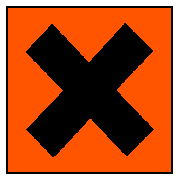International Chemical Safety Cards
| CAPTAN | ICSC: 0120 |
| CAPTAN 1,2,3,6-Tetrahydro-N-(trichloromethylthio)phthalimide 3a,4,7,7a-Tetrahydro-2-((trichloromethyl)thio)-1H-isoindole-1,3(2H)-dione C9H8Cl3NO2S Molecular mass: 300.6 CAS # 133-06-2 RTECS # GW5075000 ICSC # 0120 UN # 2773 EC # 613-044-00-6 |
 |
| TYPES OF HAZARD/ EXPOSURE |
ACUTE HAZARDS/ SYMPTOMS |
PREVENTION | FIRST AID/ FIRE FIGHTING |
| FIRE | Combustible under specific
conditions. Liquid formulations containing organic solvents may be flammable. Gives off
irritating or toxic fumes (or gases) in a fire. |
NO open flames. |
Powder, water spray, foam,
carbon dioxide. |
| EXPLOSION | |
|
|
| EXPOSURE | |
PREVENT DISPERSION OF DUST!
AVOID ALL CONTACT! AVOID EXPOSURE OF ADOLESCENTS AND CHILDREN! |
|
| INHALATION | |
Ventilation (not if
powder). |
Fresh air, rest. Refer for
medical attention. |
| SKIN | MAY BE ABSORBED! Redness.
|
Protective gloves.
Protective clothing. |
Remove contaminated
clothes. Rinse and then wash skin with water and soap. Refer for medical attention. |
| EYES | Redness. Pain. Blurred
vision. |
Safety spectacles. |
First rinse with plenty of
water for several minutes (remove contact lenses if easily possible), then take to a
doctor. |
| INGESTION | Diarrhoea. Vomiting. |
Do not eat, drink, or smoke
during work. Wash hands before eating. |
Rinse mouth. Refer for
medical attention. |
| SPILLAGE DISPOSAL | STORAGE | PACKAGING & LABELLING | ||
| Do NOT wash away into sewer.
Sweep spilled substance into containers; if appropriate, moisten first to prevent dusting.
Carefully collect remainder, then remove to safe place (extra personal protection: P2
filter respirator for harmful particles). |
Provision to contain
effluent from fire extinguishing. Separated from food and feedstuffs. Ventilation along
the floor. |
Do not transport with food
and feedstuffs. Xn symbol R: 36-40-43 S: (2-)36/37 UN Hazard Class: 6.1 |
||
| SEE IMPORTANT INFORMATION ON BACK | ||||
|
||||